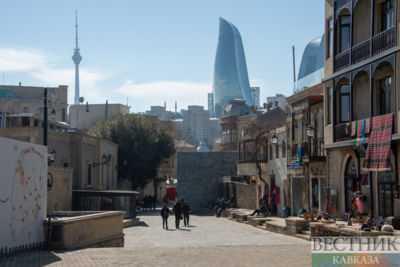The head of Rossotrudnichestvo, Eleonora Mitrofanova, takes part in the work of the 43rd session of the UNESCO World Heritage Committee in Baku. She met with compatriots living in Azerbaijan, visited historical and cultural institutions involved in the development of humanitarian ties between Moscow and Baku, and also spoke with the correspondent of Vestnik Kavkaza.
- Today, Rossotrudnichestvo works in more than 80 countries. What are the objectives of the organization in the CIS countries, in particular, in Azerbaijan?
- The CIS countries are a priority in our work. We are present on almost all continents, but the CIS countries are our closest neighbors. As Azeris say, neighbors are sometimes more important than relatives. Therefore, we have a very powerful common cultural stratum: a huge number of translations of national literature, cuisine, dancing and a lot more is in common, I'm not talking about our joint heroic past. Next year we will celebrate the 75th anniversary of the End of the Great Patriotic War, therefore we are now preparing exhibitions, documentaries and feature films to present in different countries. We will try to make sure that in each of the CIS countries, in particular in Azerbaijan, the stress is made precisely on the heroes of these republics.
We are linked by the preservation of the Russian language as a language of international communication, as well as migration from the CIS countries. Russia is a huge market, and this is its competitive advantage. Therefore, we pay special attention to teaching the Russian language, to the training and retraining of teachers of the Russian language. We thank the government of Azerbaijan for preserving the Russian language in schools. The more languages a person knows, the reacher he becomes, cultural level grows. And once again I want to focus on a common story. This is what our descendants need. So to prevent distortions, falsifications of history, we must resist this process together.
- Russia has nominated the historic center of Pskov for inclusion in the World Heritage List. Does Russia expect support from Azerbaijan? How do both countries cooperate within UNESCO?
- Pskov, I think, is one of the gems of Russian history and architecture. I think that it will be inscribed on the World Heritage List.
The 43rd session of the UNESCO World Heritage Committee is held at the Heydar Aliyev Center. Everything is amazingly organized, starting from the entrance to this wonderful building, all conditions for comfortable work are created. We have historically good cooperation with the Azerbaijani UNESCO delegation. We coordinate many positions, if we need to help each other - there is an interaction between professional communities, restorers, and historians of architecture.
- What is your estimation of the tasks discussed at UNESCO? How much do they cover the issues of modern time?
- In UNESCO, it is now a very difficult situation. In 2012, Palestine’s acceptance into the organization was followed by the ugly demarche of the US. They decided to leave the organization and did not pay for the previous period, which left UNESCO in a very serious crisis, primarily a financial one. Unfortunately, the organization has become more politicized. Many questions that would have to be resolved on an expert basis are now politicized. However, there are areas of UNESCO activity that are relevant and will stay so. This is the World Cultural Natural Heritage, 1972 Convention; this is the Convention on Intangible Heritage (Baku also hosted a meeting of this World Heritage Committee); and the Interstate Oceanographic Commission, which is an independent institution. And the fourth area covers the education issues, there is the UNESCO Institute for Lifelong Learning, which deals with statistics, essential analysis. It is necessary to pay more attention to general philosophical discussions, to look for common approaches.
- Some experts note that the Russian language is losing its former position on the world stage ...
- I perceive this issue from a different perspective. English is the language of international global communication. Russian is a completely different language. In all CIS countries, the need for Russian is very large. Yes, in Eastern Europe they speak less Russian now, but there is a need for Russian, especially in border regions, for example, in Poland.
- Today, Rossotrudnichestvo is associated with the term ‘soft power’. What concept do you mean by this term?
- This is not exactly correct. The concept of ‘soft power’ is somewhat broader - it is the economy, living standards, quality of life. ‘Soft power’ creates the attractiveness of the country, we just promote our science, culture, education, and most importantly, maintain friendly relations at the level of NGOs, at the human level. Since we have many cultural centers in many countries, we have become a natural platform for communication.
- At one of the meetings with colleagues, you called for searching the ways to cooperate with Georgia. How do you assess the latest crisis in the relationship?
- This is an absolutely man-made crisis. Someone very cleverly took advantage of the situation. In Georgia, a huge number of people who love Russia. And in Russia, no one stopped loving Georgia. During these events, we held a theater school in Georgia. People from Ukraine and from countries that allegedly are with us in some kind of confrontation came to this theater school. At the level of professional communities, at the level of people, contacts should be continued. It is an unwise decision not to allow people to go to Georgia before the holiday season.
- Is there a fundamental difference in the activities of Rossotrudnichestvo in the post-Soviet countries and in other countries?
- There is a certain difference. In the post-Soviet space, we have a much wider circle of friends, possible partners. We set the task to work throughout the post-Soviet countries - our compatriots live in many places. And in Europe, business, as usual, everything is fine-tuned.
Eleonora Mitrofanova: ”We have a very powerful common cultural stratum with the CIS countries”

12720 views















